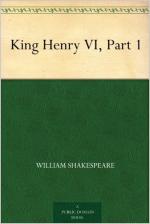|
This section contains 9,093 words (approx. 31 pages at 300 words per page) |

|
SOURCE: “The Theater, the Market, and the Subject of History,” in ELH, Vol. 61, No. 3, Fall, 1994, pp. 501-22.
In the essay below, Pye focuses on Act I, scene 4 of 1 Henry VI in order to study the economic and historical dimensions of subjectivity presented in the play.
Nothing has so consistently underwritten recent efforts to historicize the study of Renaissance drama as a perceived correspondence between economic commodification and representation. In Worlds Apart, Jean-Christophe Agnew suggests how implicated the worlds of the theater and the market were during the early modern period. With the advent of exchange-value as a property independent of use-value, the market-place evolved from a localized institution to a supervening process capable of reconstituting the very society that set it in motion. “To those caught up in this expanded circulation of commodities of the early modern epoch,” Agnew writes, “the very liquidity of the money form—its...
|
This section contains 9,093 words (approx. 31 pages at 300 words per page) |

|


